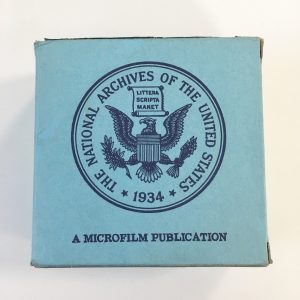When I was given the boxes of microfilms that made up the Grenville Collection, we weren’t entirely sure what their contents would be. My scholarship project, led by Dr Armin Grünbacher, required me to read the documents on the films and create a database of the information they contained, only knowing that they belonged to Professor Grenville of the university and that they were related to US foreign policy in the late 1800s. This chance to be a part of research first hand, dealing with primary sources and figuring out their contents is what primarily enticed me to the project.

When I received the films, they were in varying states, lengths and condition, from neat blue boxes labelled as property of the United States National Archives to heavy metal tins with only numbers to identify them by. Over the course of the 5 weeks, I had to learn how to use a microfilm reader and tackle problems as they came up, such as films breaking every couple of pages due to 50 years of disuse and an entire series being handwritten in Japanese. Also, a lot of the letters I was reading were drafts and therefore they were often quickly written, almost illegible and out of order. However, all these challenges are what I enjoyed most about the scholarship since by solving these problems I was able to uncover the history and see how by doing this I was contributing to future academic writing, possibly even my own.
It was also interesting to see which primary sources I engaged with more, preferring the more complicated and private letters to the formal and repetitive diplomatic relations, which helped me think about topics I would want to study in greater depth. Reading the Secretary of State John D. Long’s personal letters, which discussed his kitten drinking the cream alongside important decisions about foreign policy in Cuba, and how the Russian Prince described Britain as ‘cat-like’ for her imperialism was fascinating. I often went on to research topics that interested me, taking notes of things I’d like to look into more later and the scholarship offers flexibility and independence to allow you to discover and develop your own interests within the project beyond what is initially advertised.
There were things I struggled with at first. I didn’t not realise how much focus and motivation 5 weeks of study at 36 hours a week required, especially since my project involved one main task. In order to overcome this, I had to organise my time, creating a table of what I had covered so far and setting myself goals to make sure I was keeping on track. Seeing what I struggled with gave me greater understanding of my strengths and the skills I needed to work on for any future study or work. Plus, the support I received from my supervisor and all the other university staff was extremely useful so it’s worth asking for help if you need it.
The scholarship was one of my first experiences working within a research setting and offered invaluable insight that will be useful for deciding what I want to do as a career. I learnt things beyond what I thought I would from the initial project briefing, especially since I took advantage of the extra workshops offered within the scholarship and networked with other staff beyond my supervisor. Overall, the scholarship was a great opportunity and I highly recommend it to anyone who loves their subject.
Katriona Lawrenson, BA History
